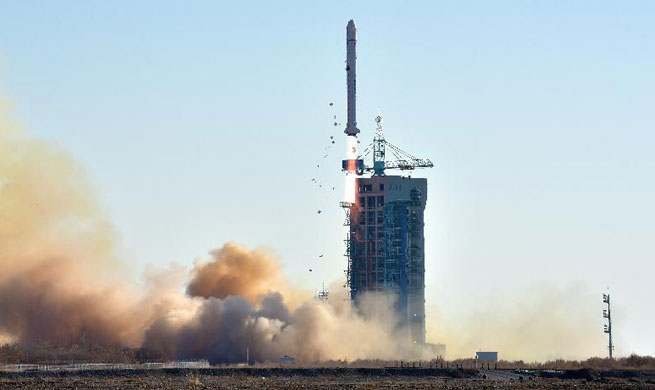LOS ANGELES, Dec. 22 (Xinhua) -- U.S. private spaceflight company SpaceX launched a recycled Falcon 9 rocket and sent another 10 satellites from Iridium Communications Inc. into orbit Friday night, as it is waiting for more next year.
The two-stage Falcon 9 booster lifted off from Space Launch Complex 4E (SLC-4E) at Vandenberg Air Force Base in California at about 5:27 p.m. local time (0127 GMT, Saturday), creating a streak of light visible to many people across Southern California.
Many people pulled their cars over to take photos and videos of the sight. Witnesses posted their photos on social media, with many wondering if it was an Unidentified Flying Object (UFO).
In June, the Falcon 9's first stage was used to send 10 satellites for Iridium Communications Inc.'s next-generation global satellite constellation, Iridium NEXT, which will ultimately include 81 satellites.
"It was definitely aliens," SpaceX founder Elon Musk wrote jokingly on Twitter, responding to one person who said the launch sparked an "alien debate."
Deployment of the 10 Iridium NEXT satellites began an hour after the launch, with the entire process taking about 15 minutes.
"We're 10 for 10! All 10 of Iridium NEXT satellites have deployed right on time in the desired orbit," John Insprucker, Falcon 9's principal integration engineer, said in a webcast.
Cheers and applause broke out in the SpaceX control room as the launch was streamed live online.
"Successful deployment of 10 @IridiumComm NEXT satellites to low-Earth orbit confirmed," tweeted SpaceX, which did not attempt to recover Falcon 9's first stage after launch.
Friday's launch was the fourth set of 10 launched by SpaceX, which brings the total number of Iridium satellites now in orbit up to 40.
"Outstanding! 40 in orbit in 2017!" said Insprucker.
SpaceX is scheduled to launch 75 of the 81 in the NEXT system. Its first launch occurred in January, followed by the second in June and the third in October. The company plans to have a total of 75 satellites launched into orbit by mid-2018.
Iridium is the only mobile voice and data satellite communications network that spans the entire globe, including across oceans, airways and polar regions.
According to the company, it is on track to fully replace the world's largest commercial satellite network of low-Earth orbit satellites in what will be one of the largest "tech upgrades" in history.
The satellite communications company has partnered with Thales Alenia Space for the manufacturing, assembling and testing of 81 Iridium NEXT satellites.
Iridium's next-generation global satellite constellation will deploy a cross-linked low-Earth orbit architecture, covering 100 percent of the Earth's surface. The process of replacing the satellites one by one in a constellation of this size and scale has never been completed before.
SpaceX has been reusing Falcon 9 first stages and is pursuing fully reusable rockets in an effort to lower the cost of spaceflight.

















